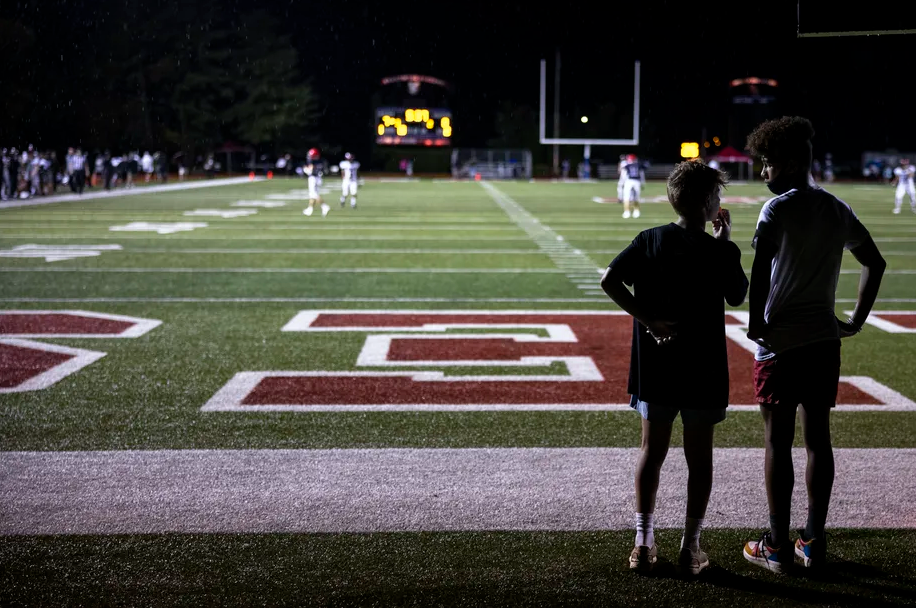New Tennessee laws increase access to school sports and college for children in foster care

He was looking forward to playing football at a Tipton County high school and building a sense of belonging through sports, said state Rep. Torrey Harris, recalling the teenager in foster care who served as inspiration for a new state law.
The high school student, said Harris, had recently moved to Tipton County to join a new foster family, and was excited to bond with his teammates. But after a few practices he was informed that he couldn’t play.
The Tennessee Secondary School Athletic Association requires students to live in a district for a year before being eligible to play a sport, a rule intended to keep powerhouse programs from recruiting unethically. Now, thanks to a new law sponsored by Harris, and signed into law in May by Tennessee Gov. Bill Lee, the one-year rule is waived for all students in foster care.
Harris, a Memphis Democrat, said that the one-year rule kept a lot of students in foster care from being able to play sports, and he added that the student who inspired the bill was “absolutely devastated” when he had to leave the team.
“An opportunity to do something that he loves, to continue to gain social skills — his motivation to want to be involved — and to get denied playing a sport because of the length of time he had been placed — at no fault of his own,” said Harris, “you can only imagine how damaging this could be for someone like” him.
The state sports association supported waiving the one-year rule for students in foster care. Bernard Childress, executive director of the association, said members of his organization met with legislators shortly after the bill was proposed. Childress added that children in foster care were never the intended target of the 12-month eligibility requirement.
“It protects kids from just jumping from one place to another — who are not in foster care — just to play for coaches,” Childress explained.
Harris said the student who inspired the law is excited that other students in similar situations will be allowed to play. The student has since moved from West Tennessee to East Tennessee, and the lawmaker plans to cross the state to watch him this fall.
“Foster care and adoption are really, really important to me,” said Harris, who also sponsored a new law that requires foster care agencies to provide children with contact information for each of their siblings.
Progress continues after landmark Brian A. settlement
Tennessee has made progress in providing more equitable education for children in foster care over the past two decades. Harris’ bills are examples of the gains that have been made during the 20 years since the settlement of the landmark Brian A. case, a class-action lawsuit that put a spotlight on education for students in the foster care system.
Settled in July 2001, the complaint filed by the advocacy group Children’s Rights alleged that students in foster care were receiving inadequate services including education.
Describing one scene, the complaint said, “‘School’ consists of two classrooms in which all 20 boys, ages 6 to 16, are taught together by two instructors, and where meaningful and legally required educational services are impossible, because the classrooms are designed only to keep a high number of children of widely different ages and abilities busy during their very short stays.”
As part of the settlement, the state Department of Children’s Services agreed to add an education attorney to its staff, and it agreed to help hire educational specialists to serve as liaisons between the department and local schools to facilitate educational planning for students in foster care.
According to a report by the Center for the Study of Social Policy, the educational specialists were essential in closing several schools run by group homes and shifting students to traditional public schools.
Department spokesman Rob Johnson said today 86% of foster children are in traditional public schools, and that it’s rare for them to live and learn in large groups at on-site schools in group homes. All public schools now have a foster care point of contact, Johnson said.
“Over nearly two decades, the department has drastically changed its approach,” Johnson said in an email. “Only those with the most severe treatment needs attend on-site schools.”
Yet work remains to ensure that the workers who support students in foster care also feel supported themselves. In the department’s 2021 culture and climate survey, 46% of respondents reported feeling some emotional exhaustion and most reported that they work more than 40 hours a week.
New law also helps college students formerly in foster care
In addition to the law sponsored by Harris which helps student athletes in foster care, another bill passed during this year’s legislative session makes college more accessible for this vulnerable population and helps students who have aged out of the system stay enrolled in college.
State Rep. William Lamberth of Portland ushered through a new law that creates a pilot program to establish liaisons at five universities to support college students after they’ve aged out of state custody.
“Many of these children have already suffered a significant setback in life by losing their parents or other circumstances that put them in foster care, and this gives them a leg up,” said the Republican lawmaker at a committee meeting earlier this year.
By serving as mentors, the liaisons will hopefully increase graduation and retention rates for students who have aged out of foster care. According to the National Foster Youth Institute, less than 3% of individuals who were formerly in foster care earn a bachelor’s degree.
Any support to keep students in school and connected to campus is welcomed, said Mike Stempkovski, clinical services director at Youth Villages, a Memphis-based foster care provider operating in 20 states.
Stempkovski said that it’s important to keep some continuity as a young person transitions into or beyond foster care. Many of them “feel like a burden,” he said. Staying in the same school or participating in team sports can give them a sense of belonging.
“School is a protective factor for children in foster care,” Stempkovski said. “If a child is well established in a school, there are relationships there.”
This article was originally posted on New Tennessee laws increase access to school sports and college for children in foster care







